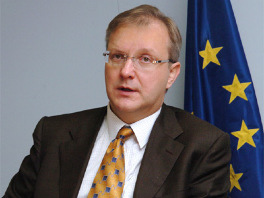
The Commission's overview of EU regionally relevant activities in the Western Balkans 2008/09 published today highlights more than 90 concrete EU-supported activities and initiatives across a wide range of sectors implemented in 2008 and planned for 2009.
Important steps towards visa-free travel to the EU, increased number of scholarships for studies in the EU, more support to civil society, further regional cooperation and integration in areas such as transport, trade, disaster preparedness, support in addressing the impact of the international financial crisis and better coordination of the massive financial assistance provided by the EU and other international donors are some of the most important developments.
"I welcome the progress achieved in the countries of the Western Balkans during the past year. I am proud that the EU contributed with concrete means to this success. I know how much free travel or possibilities to study abroad matter in people's every day life. I am looking forward to seeing further progress, as 2009 will be an important year for the EU integration of the Western Balkans." – commented Enlargement Commissioner Olli Rehn.
The dialogue on visa liberalisation started in 2008 with all Western Balkan countries concerned. Detailed roadmaps, outlining conditions, were drawn up for each country. The Commission is assessing progress in the countries and may propose lifting of the visa obligation in the course of 2009, on a country-by-country basis, provided that established benchmarks are met. To support the whole process, financial and technical assistance is provided. The decision to double the number of scholarships for students from the Western Balkans will start being implemented from the academic year 2009/2010. The annual sum of €20 million will enable several hundreds additional students to benefit from the experience of studying in the EU.
More EU programmes and agencies are being opened to the countries of the Western Balkans, enabling for example contacts and cooperation between scientific and educational institutions. All countries of the region are now participating in the 7th Research Framework programme.
Civil society development and dialogue are core priorities, playing a key role in democratic public life thus contributing to strengthen democracy and reconciliation. Under the new Civil Society Facility the funding will approximately triple.
In the area of regional cooperation there have been many developments. The newly established Regional Cooperation Council became fully operational. The free trade area, established by the Central European Free Trade Agreement (CEFTA) has a fully operational secretariat since September 2008, that will support the implementation of the agreement. This year, the Regional School of Public Administration (ReSPA) will develop into a fully fledged school with a seat in Danilovgrad (Montenegro).
To express the EU's solidarity with the countries of the region in the global economic crisis, the Commission proposed to extend its Economic Recovery Plan for the Western Balkans. To this end, at least €120 million IPA funds will be allocated to support the economic and social consolidation of the region, has been notified from the European Commission Delegation in BiH.
